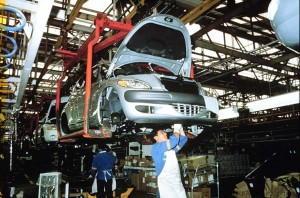
A good relationship with suppliers can have a strong impact on how things go on the assembly plant floor.
Long the go-to customers for automotive partsmakers, Toyota and Honda have seen a sharp slide in the tenor of their relationship with industry suppliers, according to a new study, while things are markedly improving when it comes to General Motors and Chrysler.
The relationship between supplies and Original Equipment Manufacturers, or OEMs, can have a significant impact on an automaker’s business, especially at a time when U.S. car sales are growing faster than anticipated and partsmakers are struggling to keep up with demand, cautioned John Henke, the president of Panning Perspectives, a suburban Detroit research firm.
“There’s enough business suppliers don’t have to take nonsense” from a manufacturer, said Henke, who today released his 12th annual survey on supplier/OEM relations.
While parts manufacturers aren’t entirely in the driver’s seat the balance of power has certainly shifted from the days, prior to the recent automotive meltdown, when a car company like Toyota or GM could call the tune, demanding the best products at the lowest prices.
Detroit makers, desperate to slash costs, routinely put the emphasis on price-cutting, even if it meant wiping out a supplier’s profit margins. Japanese makers were in a better position to pay a wee bit more in order to develop a more positive relationship.
In many cases, that meant suppliers were more than willing to go to the friendlier maker with newer technology, or otherwise meet a customer’s demands.
But things have shifted noticeably, in part because of last year’s Japanese earthquake and tsunami – which cost Asian makers like Toyota and Honda massive amounts of lost production – as well as shifting exchange rates that have hurt their margins. Meanwhile, union concessions have helped Detroit further close the production cost gap.
So, as Toyota and Honda now put the squeeze on their suppliers the study shows the relationship souring – even as increasingly profitable GM and Chrysler have the luxury of mending fences. Ford and Nissn ranked about the same as last year in the new survey.
Toyota slipped to 296 points, Honda to 293, according to Henke, their lowest scores ever. In the study, based on 17 variables, such as how much suppliers are involved in the product development process, Ford ranked 267, down slightly from 271 last year. Nissan rose a slight bit, from 247 to 256. GM did its best in the course of the 12-year history of the study, at 251, Chrysler rising to 248.
Officially, Planning Perspectives does not include the German “transplants” in its study, but will begin doing so in 2013. Had they been covered this year, however, BMW would have ranked tops, at 307, with Mercedes-Benz at 300. Volkswagen – which just opened a plant in Chattanooga last year – would have anchored the study at 247. According to Henke, all of the Germans slid from 2011.
While Detroit’s relationship with suppliers is clearly on the mend a full 40% of partsmakers still described the situation as “poor,” or worse.
In a statement, GM said its goal is to “be number one in all areas,” adding that Toyota’s top parts purchasing executive in the U.S., Bob Young, meanwhile acknowledged, “We clearly understand we have work to do in strengthening our relationships.”
